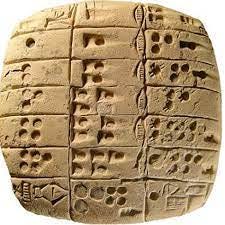Introduction:
Accounting, often considered the language of business, has a rich and diverse history dating back to ancient civilizations. From its humble beginnings on stone tablets to the advent of double-entry bookkeeping and the revolutionary emergence of Bitcoin's triple entry ledger, the journey of accounting is both fascinating and pivotal to our understanding of economic systems. Join me as we embark on a journey through time to explore the evolution of accounting, culminating in the exciting world of Bitcoin.
Ancient Beginnings:
Our journey begins in the ancient world, where rudimentary forms of accounting were born out of necessity. In Mesopotamia, clay tablets were used to record transactions of goods and services, marking the earliest known instances of accounting practices. These records, etched into the clay, provided insights into the economic activities of ancient civilizations, laying the foundation for modern accounting principles.
Double Entry Bookkeeping:
Fast forward to the Renaissance period in Italy, and we encounter a pivotal moment in the history of accounting - the invention of double-entry bookkeeping by Luca Pacioli. Pacioli's system, outlined in his seminal work "Summa de Arithmetica," revolutionized accounting by introducing the concept of debits and credits, providing a systematic way to record financial transactions accurately. Double-entry bookkeeping became the gold standard for accounting practices, facilitating the growth of commerce and trade during the Renaissance and beyond. Here’s how it works:
In traditional double-entry accounting, each financial transaction is recorded in two separate accounts: a debit and a credit.
The basic premise of double entry is that for every transaction, there is an equal and opposite entry in another account.
For example, when a business makes a sale, it records the revenue as a credit in the revenue account and a corresponding debit in the cash or accounts receivable account.
This system helps ensure accuracy and integrity in financial records by providing a balanced view of assets, liabilities, and equity.
The Rise of Blockchain Technology:
As we move into the 21st century, the digital age brings forth new challenges and opportunities for accounting. Enter blockchain technology, the backbone of Bitcoin. Unlike traditional accounting ledgers, which rely on centralized authorities to maintain records, blockchain operates on a decentralized network of computers, ensuring transparency, security, and immutability of transactions.
Bitcoin's Triple Entry Ledger:
Bitcoin, the world's first decentralized digital currency, introduced a groundbreaking concept - the triple entry ledger. Building upon the principles of double-entry bookkeeping, Bitcoin's blockchain records transactions in a transparent and tamper-proof manner, with each transaction verified and stored across a distributed network of nodes. This triple entry system eliminates the need for intermediaries, such as banks or auditors, by providing a secure and open ledger accessible to all participants. Here’s how it works:
Bitcoin's blockchain takes the principles of double entry and adds a new dimension to it, hence the term "triple entry."
The "triple" part comes from the addition of a third entry that is created when a transaction occurs on the blockchain.
In Bitcoin's blockchain, the first entry is the debit, the second entry is the credit, and the third entry is the transaction recorded on the decentralized ledger.
When a transaction occurs, it is recorded as a transfer of value from one address to another on the blockchain.
This transaction is then verified by miners on the network, who add it to a block of transactions.
Once the block is added to the chain, the transaction becomes a permanent record, creating the third entry.
So, in addition to the debit and credit entries in the involved parties' accounts, there is a third entry on the blockchain, providing an immutable and transparent record of the transaction.
Advantages of Bitcoin's Ledger:
The adoption of Bitcoin's ledger offers numerous advantages over traditional accounting methods. Firstly, the decentralized nature of the blockchain ensures that transactions are transparent and resistant to manipulation, reducing the risk of fraud and errors. Additionally, the use of cryptographic techniques ensures the security and privacy of financial data, safeguarding sensitive information from unauthorized access.
Furthermore, Bitcoin's ledger enables real-time auditing of transactions, allowing stakeholders to verify the authenticity and integrity of financial records instantaneously. By simply knowing the addresses where coins are stored, auditors can track the flow of funds with unprecedented accuracy, enhancing trust and accountability in the financial system. A notable example here, El Salvador’s recent disclosure of their Bitcoin address:
Conclusion:
In conclusion, the evolution of accounting from stone tablets to Bitcoin represents a remarkable journey of innovation and progress. From the ancient civilizations of Mesopotamia to the digital age, accounting has continuously adapted to meet the evolving needs of society. Bitcoin's triple entry ledger stands as a testament to the transformative power of technology, offering a secure, transparent, and decentralized solution to the challenges of modern accounting. As we embrace the future of finance, let us celebrate the enduring legacy of accounting and its indispensable role in shaping the world of business. Full disclosure: I’m an accountant and I actually find this stuff interesting. If you got this far, congratulations!
Not financial or legal advice, for entertainment only, do your own homework. I hope you find this post useful as you chart your personal financial course and Build a Bitcoin Fortress in 2024.
Thanks for supporting my work. Always remember: freedom, health and positivity!
Please also check out my Bitcoin Fortress Podcast on all your favorite streaming platforms. I do a weekly Bitcoin news update every week on current items of interest to the Bitcoin community, usually 30 to 60 minutes depending on the number of topics to cover. Please check it out if you haven’t already. Also now on Fountain, where you can earn Bitcoin just for listening to your favorite podcasts.
Follow me on Nostr:
npub122fpu8lwu2eu2zfmrymcfed9tfgeray5quj78jm6zavj78phnqdsu3v4h5
If you’re looking for more great Bitcoin signal, check out friend of the show Pleb Underground here.










Interesting 🤔 article. I think I understand the clay tablets better than the early double-entry hand chart. As a long-time small operational finance person I also appreciate the clarity and the uninvolved 3rd level of transaction tracking in Bitcoin. You can hide alot of shady dealings using journal entries inside of QBO and the surface user won't know. Thanks for sharing a thoughtful piece.